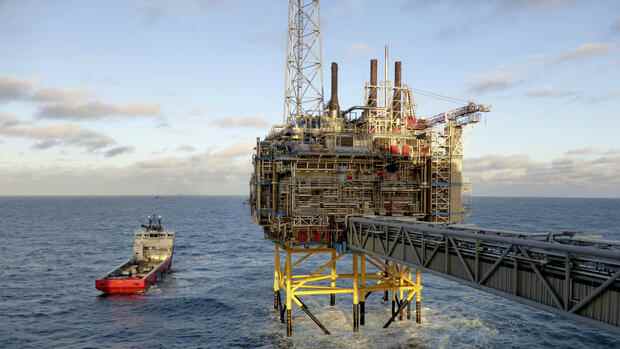Stockholm The strike by oil and gas workers fighting for higher wages in Norway has ended. The government intervened, union leader Audun Ingvartsen told Reuters on Tuesday evening. Staff would return to work as soon as possible. The Norwegian Ministry of Labor previously announced that it would be able to end the strike in exceptional circumstances. Against the background of the Ukraine war, European countries are dependent on oil from Norway.
The strike triggered major concerns about Europe’s security of supply. 74 workers on three Norwegian oil and gas platforms had walked out, potentially shutting down up to a quarter of Norway’s gas production.
The industrial action lost 89,000 barrels of oil equivalent, said a spokesman for the Norwegian industrial association Norsk olje og gass. Gas production accounted for 27,500 barrels of oil equivalent. Prices rose on the commodity markets because of the strike: the British wholesale price for gas for next-day delivery jumped a good 18 percent.
Because of the work stoppages, the Norwegian energy company Equinor had stopped oil and gas production in the Gudrun, Oseberg Sör and Oseberg Öst fields.
Top jobs of the day
Find the best jobs now and
be notified by email.
After the throttling of Russian gas supplies, the EU countries are more dependent than ever on supplies from Norway. Even before the war in Ukraine, Norway was one of the most important suppliers of oil and gas. About a fifth of the gas supplies to the countries of the EU come from Norway, about 40 percent came from Russia before the outbreak of the war.
Last month, representatives of the EU and Norway successfully negotiated an increase in delivery volumes. The Scandinavian country has agreed to increase gas production by around eight percent this year.
Strikes over high inflation
The strike broke out after a failed mediation attempt last week. The Lederne oil and gas workers’ union is demanding a wage increase of 5.7 percent because of the significant increase in inflation in Norway.
>>Read here: Russia’s revenge: a possible gas supply stop is Europe not prepared
Norway was recently accused of profiting from the Russian invasion of Ukraine and the resulting sharp rise in oil and gas prices. However, the government in Oslo has contradicted this. “We have higher income from oil and gas sales, but the oil fund has lost more than income has increased,” said Norway’s Finance Minister Trygve Slagsvold.
>>Read here: These ten sectors would be most affected by a gas supply stop
The Norwegian Oil Fund is the largest sovereign wealth fund in the world. It was founded in 1996 in order to be able to finance the welfare state even after the oil and gas wells have dried up. State revenues from the country’s oil business flow into the fund. However, it not only serves to provide social security, but is also intended to keep the national budget in balance.
The sovereign wealth fund is currently involved in around 9,000 companies in 80 countries. He owns around 1.4 percent of the shares issued worldwide and 2.5 percent of the European shares. In Germany, the fund holds shares in more than four percent of the Dax companies.
Since Russian troops invaded Ukraine, the fund has drastically reduced its investments in Russia: Before the war broke out it was 27 billion crowns (2.6 billion euros) and now it is only around 2.4 billion. Since the war, the fund’s assets under management have actually declined. At the end of last year, the fund managed 12.34 trillion crowns, today it is still 11.74 trillion crowns.
More: Norway’s energy group Equinor: “We deliver as much gas as possible”

